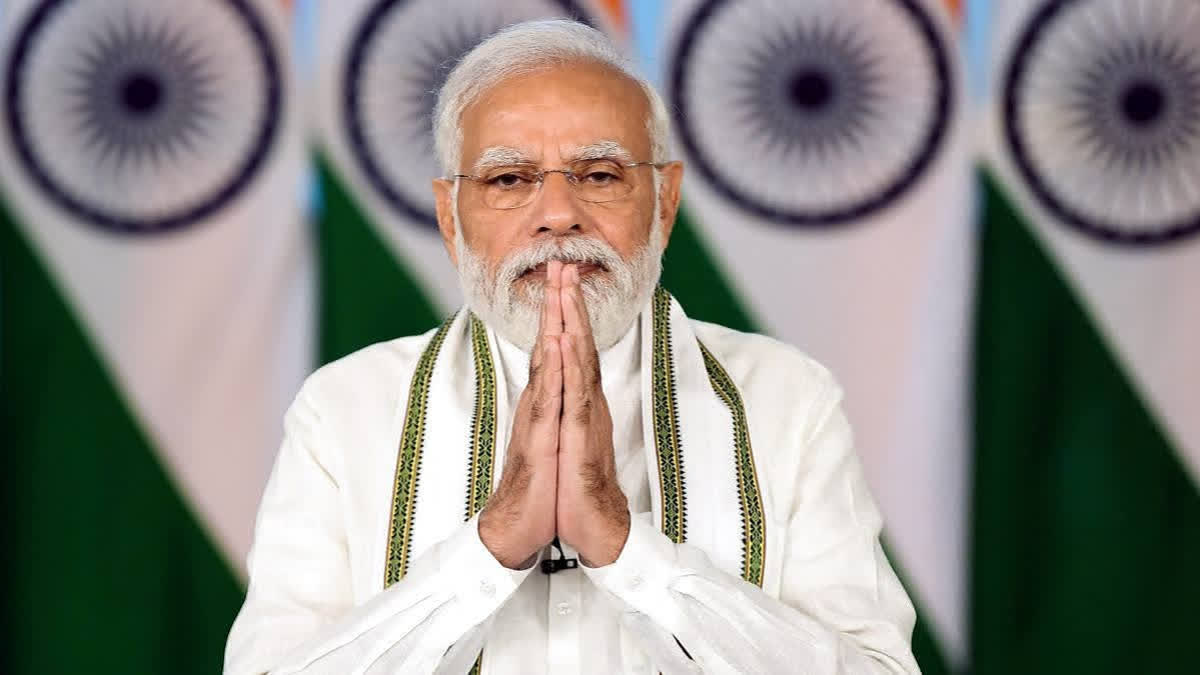New Delhi: Prime Minister Narendra Modi on Tuesday highlighted the nation’s ambitious energy objectives and its pivotal role in the global energy arena in a video message at the India Energy Week 2025.
He pointed out that experts around the world are confident that the 21st century will be defined by India, with the energy sector being a key driver of this change. He presented India’s energy vision, which is built on five essential pillars: utilising natural resources, promoting innovation, ensuring economic resilience and political stability, capitalising on strategic geography for energy trade, and upholding a strong commitment to global sustainability.
India’s Bold Energy Goals for 2030
The Prime Minister stressed that the upcoming two decades are vital for India’s path toward becoming a Viksit Bharat (developed nation). He mentioned that the country is poised to reach several important milestones in the next five years, in line with its energy objectives for 2030. These goals include:
- Adding 500 gigawatts of renewable energy capacity.
- Achieving net-zero carbon emissions for Indian Railways.
- Producing five million metric tons of green hydrogen each year.
While these targets may appear ambitious, Modi expressed his belief in India’s capability to achieve them, referring the impressive advancements made over the last decade.
India’s Energy Transformation Over the Past Decade
PM Modi noted the swift growth of India’s economy and energy sector, highlighting:
- The nation has advanced from being the tenth largest to the fifth largest economy in just ten years.
- Solar energy generation capacity has surged 32 times, positioning India as the third-largest solar power producer in the world.
- Non-fossil fuel energy capacity has tripled.
- India is the first G20 nation to fulfill its commitments under the Paris Agreement.
Success in Ethanol Blending and Biofuels
The Prime Minister underscored India’s leadership in ethanol blending, achieving a 19 percent blending rate, which has resulted in:
- Savings in foreign exchange
- Increased income for farmers
- A reduction in CO₂ emissions
India is set to achieve 20 percent ethanol blending by October 2025. The Prime Minister also pointed out the formation of the Global Biofuels Alliance during India’s G20 presidency, which now comprises 28 countries and 12 international organisations. This initiative is aimed at turning waste into wealth while encouraging sustainable fuel alternatives.
Expanding India’s Hydrocarbon and Natural Gas Sector
PM Modi emphasised the government's dedication to tapping into India’s hydrocarbon resources, implementing significant policy reforms to draw in investment. He mentioned:
- India’s gas sector is growing thanks to new discoveries and a comprehensive pipeline network.
- India ranks as the fourth-largest refining hub and is working to boost refining capacity by 20%.
- The Open Acreage Licensing Policy (OALP) and a single-window clearance system have enhanced the appeal of India’s upstream sector.
- Revisions to the Oilfields Regulation & Development Act provide policy stability, extended leases, and better financial terms for stakeholders.
With a rise in natural gas discoveries and expanding infrastructure, the use of natural gas is anticipated to increase, offering substantial investment opportunities.
Boosting India’s Manufacturing and Clean Energy Goals
The Prime Minister reiterated India’s commitment to Make in India, showcasing opportunities in local manufacturing and supply chains. India’s solar PV module manufacturing capacity has surged from 2 GW to 70 GW over the past decade. The Production Linked Incentive (PLI) scheme is enhancing the attractiveness of solar manufacturing. Advancements in battery storage and electric mobility are generating significant opportunities.
The government has implemented custom duty exemptions on essential minerals such as cobalt, lithium-ion battery waste, lead, and zinc to promote battery manufacturing. The Prime Minister highlighted that the National Critical Minerals Mission will play a crucial role in establishing a robust supply chain for energy storage solutions.
Opening the Nuclear Energy Sector
In a significant move, the 2025 budget has paved the way for investments in the nuclear energy sector, unlocking fresh prospects in green energy and job creation. The Prime Minister emphasised the PM Suryagarh Free Electricity Scheme, which aims to:
- Enable families and farmers to generate their own energy.
- Foster new skills and service networks within the solar industry.
- Broaden investment avenues in renewable energy solutions.
PM Modi concluded reaffirming India's dedication to energy solutions that drive growth while safeguarding the environment. He urged stakeholders to seize the investment and innovation opportunities arising in India's energy sector.
Read more



